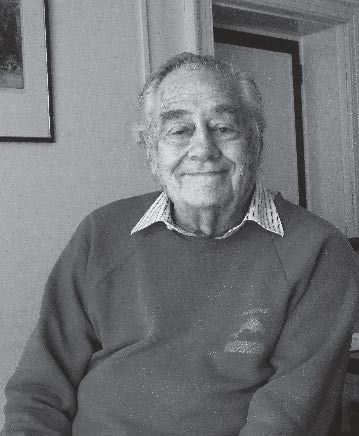
Physiology News Magazine
Obituary: Olof Conrad John Lippold
1923 – 2016
Membership
Obituary: Olof Conrad John Lippold
1923 – 2016
Membership
Lynn Bindman & Richard Cogdell
https://doi.org/10.36866/pn.107.49
In 1960, I started my PhD with Olof, studying neuronal activity in the cerebral cortex of anaesthetised rats. At that time he was sub-Dean and Tutor to the medical students and I was struck by how very kind and patient he was with them. He didn’t have an office separate from the lab, and I was experimenting behind a partition wall. Sometimes the medical students had some serious things they wanted to discuss with Olof. One of the foreign students was pregnant, far from her family, and the baby was illegitimate, a difficult situation in those days. I was taken by Olof to visit her and the newborn baby, with a large parcel from Kay and himself as a gift.
It was also a revelation to me that neither Olof, nor our part-time colleague Dr Joe Redfearn, ever got cross or irritable with me when I did something stupid in the lab – a useful life skill for me to learn.
Although we were very serious about our experiments and Physiological Society activities, life at UCL was great fun in the 1960s and ‘70s. As well as sports at Shenley, there was time for staff/student Christmas parties, an annual childrens’ fun fair in the cloisters and communal lunches before lunch-hour lectures. Olof participated fully in everything.
We wrote up papers together, with Joe while picnicking on Winterfold Hill, or on an island in the river at Walton-on-Thames, chaperoned by Olof’s parents. I loved that place, and when Olof told my husband Geoffrey and me in 1970 that the hut next to his had become free, we moved with our three young children into the holiday hut next door (no running water except for the river, no electricity then and no sanitation).
Olof and I collaborated again in the late 1970s, experimenting on pyramidal tract neurones with Alex Milne, and writing a book on the cerebral cortex. Meanwhile, the children were growing up; at the island Olof supervised my tar papering of the leaking hut roof, advised our boys how to service the motor mower and build up the river bank, and of course we all rowed, canoed and swam in the Thames. Olof was a wonderful mentor and friend to us all.
Lynn Bindman
Honorary Reader, Department of Neuroscience, Pharmacology and Physiology, University College London, UK
Olof Conrad John Lippold was born on 13 February 1923 in London to a school master father and a Swedish mother. Olof trained to be a medical doctor at University College Hospital (UCH) during the Second World War, when the preclinical medical school was evacuated to Leatherhead. The clinical training at UCH remained in London, with bombs falling nearby. Olof remembered in particular a V2 landing next to Goodge St. station and being knee-deep in glass helping the wounded. He qualified in 1946, and did his army service as a regimental medical officer in the Royal Engineers, then at the Army Operational Research Group, before returning to spend most of his career working in the Physiology Department at University College London.
Olof was passionate both about his research and his teaching. He particularly liked the fact that in the ‘50s and ‘60s, if you wanted to do research then you had to be prepared to build your own equipment. He enjoyed doing that almost as much as carrying out the actual experiments. His main research interests were in the areas of muscle units, tremor and long-term changes in neural activity in the cerebral cortex following weak electrical stimulation. This latter area has recently become at hot topic, and one of Olof’s papers from 1964 was remarkably cited more than 50 times just this last year! Indeed, his work on humans and animals from the 1960s has been more heavily cited these past 4 years than ever before. How many of us will have that accolade? Olof enjoyed teaching both medical and science students. He was often dissatisfied with the available textbooks and so sat down and wrote his own.
He had, very importantly, a strong influence on the recruitment of medical students at UCL where he championed not only admitting more female students but also more people with non-standard backgrounds.
Olof retired from UCL and then became Head of Department of Physiology at Royal Holloway College where he continued to research and teach. When he finally retired he built a lab in his own house and continued with his experiments. Indeed, he published his last paper in 2000 and only stopped publishing when he could no longer afford the journal page charges.
Olof was very committed to his family. He was married to his wife Kay, who he met as a nurse in UCH, for more than 60 years. He was very proud of all of their six children and foster son, as well as their many grandchildren and great grandchildren. He loved to travel for both work and pleasure. He had long-standing collaborations in the US, New Zealand and Australia. For one sabbatical in New Zealand he and Kay took several of their children and travelled overland as far as India before flying on to New Zealand. Their epic trek through countries such as Iran and Afghanistan would sadly not now be possible.
Olof was also a keen sportsman. He played cricket and tennis at UCL and in later life took up swimming very seriously. He and Kay loved competing in Masters’ competitions all round the world, often both winning gold medals. Olof died peacefully on 7 December 2016, aged 93.
Richard Cogdell (Olof’s son-in-law)
Hooker Professor of Botany, University of Glasgow, UK

